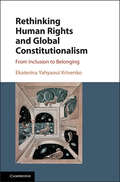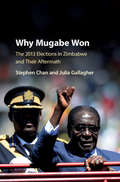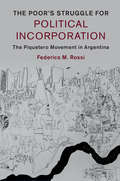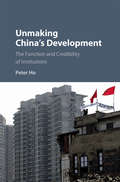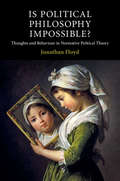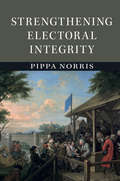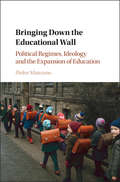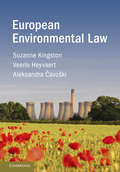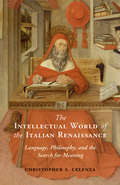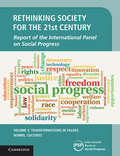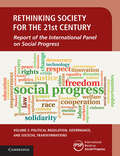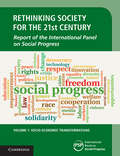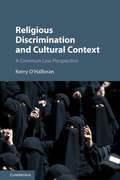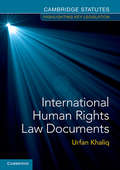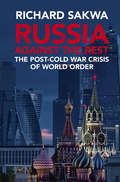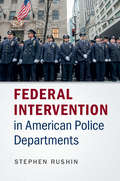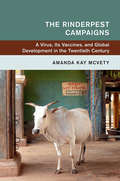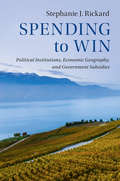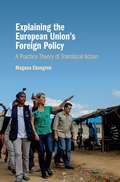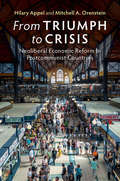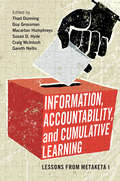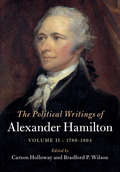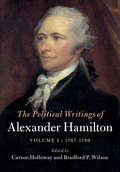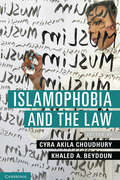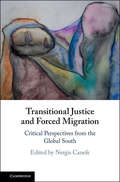- Table View
- List View
Rethinking Human Rights and Global Constitutionalism: From Inclusion to Belonging
by Krivenko Ekaterina YahyaouiAre human rights really a building block of global constitutionalism? Does global constitutionalism have any future in the theory and practice of international law and global governance? This book critically examines these key questions by focusing on the mechanisms utilised by global constitutionalism whilst comparing the historical functioning of constitutional rights in national systems. Yahyaoui Krivenko provides new insights into the workings of human rights and associated notions, such as the state, the political, and the individual, by demonstrating that human rights are antithetical to global constitutionalism and encouraging new discussions on the meaning of global constitutionalism and human rights. Drawing on the interdisciplinary works of such thinkers as Agamben, Luhmann, Bourdieu, Deleuze and Guattari, this book also considers practical examples from historical experience of ancient Greek and early Islamic societies. It will appeal to scholars interested in human rights, international law and critical legal theory.
Why Mugabe Won: The 2013 Elections in Zimbabwe and their Aftermath
by Stephen Chan Julia GallagherThe 2013 general elections in Zimbabwe were widely expected to mark a shift in the nation's political system, and a greater role for the opposition Movement for Democratic Change (MDC), led by Prime Minister Morgan Tsvangirai. However, the results, surprisingly, were overwhelmingly in favour of long-time President Robert Mugabe, who swept the presidential, parliamentary and senatorial polls under relatively credible and peaceful conditions. In this book, a valuable and accessible read for both students and scholars working in African politics, and those with a general interest in the politics of the region, Stephen Chan and Julia Gallagher explore the domestic and international context of these landmark elections. Drawing on extensive research among political elites, grassroots activists and ordinary voters, Chan and Gallagher examine the key personalities, dramatic events, and broader social and political context of Mugabe's success, and what this means as Zimbabwe moves towards a future without Mugabe.
Cambridge Studies in Contentious Politics: The Piquetero Movement in Argentina (Cambridge Studies in Contentious Politics)
by Rossi Federico M.This book offers an innovative perspective on the ever-widening gap between the poor and the state in Latin American politics. It presents a comprehensive analysis of the main social movement that mobilized the poor and unemployed people of Argentina to end neoliberalism and to attain incorporation into a more inclusive and equal society. The piquetero (picketer) movement is the largest movement of unemployed people in the world. This movement has transformed Argentine politics to the extent of becoming part of the governing coalition for more than a decade. Rossi argues that the movement has been part of a long-term struggle by the poor for socio-political participation in the polity after having been excluded by authoritarian regimes and neoliberal reforms. He conceptualizes this process as a wave of incorporation, exploring the characteristics of this major redefinition of politics in Latin America.
Unmaking China’s Development: The Function and Credibility of Institutions
by Peter HoWhy would the removal of authoritarian institutions in some developing countries lead to sustained socio-economic crisis, while others experience explosive growth despite "persisting" informal, insecure and rent-seeking institutional arrangements? A key to solving this enigma lies in understanding China, a country where the paradoxes of development are highly visible. Peter Ho argues that understanding China's economy necessitates an analytical refocusing from Form to Function, detached from normative assumptions about institutional appearance and developing instead a "Credibility Thesis". In this reading, once institutions endogenously emerge and persist through actors' conflicting interactions, they are credible. Ho develops this idea theoretically, methodologically, and empirically by examining institutions around the sector that propelled, yet, simultaneously destabilizes development: real estate - land, housing and natural resources. Ho shows how this sector can further both our understanding of institutions and issues of capital, labor, infrastructure and technology.
Contemporary Political Theory: Thoughts and Behaviour in Normative Political Theory (Contemporary Political Theory)
by Jonathan FloydPolitical philosophy seems both impossible to do and impossible to avoid. Impossible to do, because we cannot agree on a single set of political principles. Impossible to avoid, because we're always living with some kind of political system, and thus some set of principles. So, if we can't do the philosophy, but can't escape the politics, what are we to do? Jonathan Floyd argues that the answer lies in political philosophy's deepest methodological commitments. First, he shows how political philosophy is practiced as a kind of 'thinking about thinking'. Second, he unpicks the different types of thought we think about, such as considered judgements, or intuitive responses to moral dilemmas, and assesses whether any are fit for purpose. Third, he offers an alternative approach - 'normative behaviourism' - which holds that rather than studying our thinking, we should study our behaviour. Perhaps, just sometimes, actions speak louder than thoughts.
Strengthening Electoral Integrity
by Pippa NorrisToday a general mood of pessimism surrounds Western efforts to strengthen elections and democracy abroad. If elections are often deeply flawed or even broken in many countries around the world, can anything be done to fix them? To counter the prevailing ethos, Pippa Norris presents new evidence for why programs of international electoral assistance work. She evaluates the effectiveness of several practical remedies, including efforts designed to reform electoral laws, strengthen women's representation, build effective electoral management bodies, promote balanced campaign communications, regulate political money, and improve voter registration. Pippa Norris argues that it would be a tragedy to undermine progress by withdrawing from international engagement. Instead, the international community needs to learn the lessons of what works best to strengthen electoral integrity, to focus activities and resources upon the most effective programs, and to innovate after a quarter century of efforts to strengthen electoral integrity. Compares the strengths and weaknesses of agencies and programs with the threats and opportunities for electoral assistance The theory is tested empirically with new data using worldwide comparisons The trilogy establishes a new research agenda in comparative politics, development studies, electoral studies, and voting behavior
Bringing Down the Educational Wall: Political Regimes, Ideology, and the Expansion of Education
by Dulce ManzanoBringing Down the Educational Wall studies the causes of educational expansion in a global sample of developing and developed countries from 1960 to 2005. The book explores how the interaction between the economic context of nations (economic development and inequality) and political factors (the type of political regime and the ideology of dictatorships) influences countries' educational outcomes. The book's main contributions are the exploration of ideological differences between autocratic regimes and the tracing of changes in different parts of the income distribution, which accounts for education expanding to broad sectors of the population. Bringing Down the Educational Wall introduces a new database on the ideology of dictatorships and uses quantitative methods and case analyses to test its theoretical arguments. This work will help students in comparative politics and political economy courses to develop their understanding of redistributive policies and the effects of political factors on the expansion of education.
European Environmental Law (Routledge Research In European Union Law Ser.)
by Suzanne Kingston Veerle Heyvaert Aleksandra ČavoškiEU Environmental Law is a critical, comprehensive and engaging account of the essential and emerging issues in European environmental law and regulation today. Suitable for advanced undergraduate and postgraduate students, the book delivers a thematic and contextual treatment of the subject for those taking courses in environmental law, environmental studies, regulation and public policy, and government and international relations. Placing the key issues in context, EU Environmental Law takes an interdisciplinary and thematic approach to help students to better understand the implementation and enforcement of environmental law and policy across Europe. It offers an accessible overview, and links theory with practical applications that will allow students to contextualise the outcomes of legal rules and their impact on public and private behaviours. It provides a definitive account of the subject, examining traditional topics such as nature conservation law, waste law and water law, alongside increasingly important fields such as the law of climate change, environmental human rights law, and regulation of GMOs and nanotechnology.
The Intellectual World of the Italian Renaissance: Language, Philosophy, and the Search for Meaning
by Celenza Christopher S.In this book, Christopher Celenza provides an intellectual history of the Italian Renaissance during the long fifteenth century, from c. 1350-1525. His book fills a bibliographic gap between Petrarch and Machiavelli and offers clear case studies of contemporary luminaries, including Leonardo Bruni, Poggio Bracciolini, Lorenzo Valla, Marsilio Ficino, Angelo Poliziano, and Pietro Bembo. Integrating sources in Italian and Latin, Celenza focuses on the linked issues of language and philosophy. He also examines the conditions in which Renaissance intellectuals operated in an era before the invention of printing, analyzing reading strategies and showing how texts were consulted, and how new ideas were generated as a result of conversations, both oral and epistolary. The result is a volume that offers a new view on both the history of philosophy and Italian Renaissance intellectual life. It will serve as a key resource for students and scholars of early modern Italian humanism and culture.
Rethinking Society for the 21st Century: Report of the International Panel on Social Progress
by International Panel on Social ProgressThis is the third of three volumes containing a report from the International Panel on Social Progress (IPSP). The IPSP is an independent association of top research scholars with the goal of assessing methods for improving the main institutions of modern societies. Written in accessible language by scholars across the social sciences and humanities, these volumes assess the achievements of world societies in past centuries, the current trends, the dangers that we are now facing, and the possible futures in the twenty-first century. It covers the main socio-economic, political, and cultural dimensions of social progress, global as well as regional issues, and the diversity of challenges and their interplay around the world. This particular volume covers topics such as world cultures and religions, families, global health, education, and the contributions of social sciences to institutional change.
Rethinking Society for the 21st Century: Report of the International Panel on Social Progress
by International Panel on Social ProgressThis is the second of three volumes containing a report from the International Panel on Social Progress (IPSP). The IPSP is an independent association of top research scholars with the goal of assessing methods for improving the main institutions of modern societies. Written in accessible language by scholars across the social sciences and humanities, these volumes assess the achievements of world societies in past centuries, the current trends, the dangers that we are now facing, and the possible futures in the twenty-first century. It covers the main socio-economic, political, and cultural dimensions of social progress, global as well as regional issues, and the diversity of challenges and their interplay around the world. This particular volume covers topics such as democracy and the rule of law, violence and wars, international organizations and global governance, and media and communications.
Rethinking Society for the 21st Century: Report of the International Panel on Social Progress
by International Panel on Social ProgressThis is the first of three volumes containing a report from the International Panel on Social Progress (IPSP). The IPSP is an independent association of top research scholars with the goal of assessing methods for improving the main institutions of modern societies. Written in accessible language by scholars across the social sciences and humanities, these volumes assess the achievements of world societies in past centuries, the current trends, the dangers that we are now facing, and the possible futures in the twenty-first century. It covers the main socio-economic, political, and cultural dimensions of social progress, global as well as regional issues, and the diversity of challenges and their interplay around the world. This particular volume covers topics such as economic inequality and growth, finance and corporations, labor, capitalism, and social justice.
Religious Discrimination and Cultural Context: A Common Law Perspective
by Kerry O'HalloranGenerations of festering culture wars, compounded by actual wars in predominantly Muslim countries, the terrorism of Isis, and the ongoing migrant crisis have all combined to make religious discrimination the most pressing challenge now facing many governments. For the leading common law nations, with their shared Christian cultural heritage balanced by a growing secularism, the threat presented by this toxic mix has the potential to destabilise civil society. This book suggests that the instances of religious discrimination, as currently legally defined, are constrained by that cultural context, exacerbated by a policy of multiculturalism, and in practice, conflated with racial, ethnic or other forms of discrimination. Kerry O'Halloran argues that many culture war issues - such as those that surround the pro-choice/pro-life debate and the rights of the LGBT community - can be viewed as rooted in the same Christian morality that underpins the law relating to religious discrimination. Suggests that present forms of religious discrimination are shaped by past cultural traditions. Demonstrates how many culture war issues - such as abortion and gay marriage - are forms of religious discrimination. Provides a comparative analysis of religious discrimination case law which shows how judicial treatment of matters such as accommodating religious belief in the workplace varies on a jurisdictional basis.
International Human Rights Law Documents
by Urfan KhaliqThis accessible collection of important international human rights documents is an essential resource for students and researchers of international human rights law. In addition to standard instruments such as the Universal Declaration, the 1966 United Nations Covenants and the European Convention and its Protocols, the volume also features topics and documents such as all core UN human rights treaties and their protocols, key international labour instruments and the obligations of the global financial organisations and multi-national corporations. Taking a broad and historical approach, the collection also incorporates Inter-American, African, Asian and Arab instruments alongside older UN documents and numerous soft law documents. Its approach reflects the diverse nature of international human rights law and the courses which now seek to teach it. This book is also valuable for students of international law, global governance and other courses which discuss the law of international human rights.
Russia against the Rest: The Post-Cold War Crisis of World Order
by Richard SakwaIn this book Richard Sakwa provides a new analysis of the end of the Cold War and the subsequent failure to create a comprehensive and inclusive peace order in Europe. The end of the Cold War did not create a sustainable peace system. Instead, for a quarter of a century a 'cold peace' reflected the tension between cooperative and competitive behaviour. None of the fundamental problems of European security were resolved, and tensions accumulated. In 2014 the crisis exploded in the form of conflict in Ukraine, provoking what some call a 'new Cold War'. Russia against the Rest challenges the view that this is a replay of the old conflict, explaining how the tensions between Russia and the Atlantic community reflect a global realignment of the international system. Sakwa provides a balanced and carefully researched analysis of the trajectory of European and global politics since the late 1980s.
Federal Intervention in American Police Departments
by Stephen RushinFor much of American history, the federal government has played a limited role in local police regulation. That all changed in 1994, when Congress passed a little known statute that permitted the US Attorney General to reform troubled police departments. Since then, many of the nation's largest police departments - including those in Los Angeles, Chicago, Seattle, Washington, DC, New Orleans, Pittsburgh, Cincinnati, Cleveland, and Albuquerque - have been subject to federal oversight. But until recently, we've known little about how this federal process works. Drawing on original interviews, court documents, statistical data, and media reports, this book provides the first comprehensive account of federal intervention in American police departments. It shows that, under the right circumstances, federal intervention is uniquely effective at combating misconduct in police departments. However, federal intervention is far from perfect. This book concludes by arguing that Congress should expand and improve federal oversight of policing.
The Rinderpest Campaigns: A Virus, Its Vaccines, and Global Development in the Twentieth Century (Global and International History)
by Amanda Kay McVetyAmanda Kay McVety has written the first history of the international effort to eradicate rinderpest - a devastating cattle disease - which began in the 1940s and ended in 2011. Rinderpest is the only other disease besides smallpox to have been eradicated, but very few people in the United States know about it, because it did not infect humans and never broke out in North America. In other parts of the world, however, rinderpest was a serious economic and social burden and the struggle against it was a critical part of the effort to fight poverty and hunger globally. McVety follows the deployment of rinderpest vaccines around the globe, exploring the role of the environment in the understanding of development, internationalism, and national security. She expands the standard Cold War narratives to show how these concepts were framed not only by economic and political concerns, but also by biological ones.
Spending to Win: Electoral Institutions, Economic Geography, And Subsidies (Political Economy Of Institutions And Decisions)
by Stephanie J. RickardGovernments in some democracies target economic policies, like industrial subsidies, to small groups at the expense of many. Why do some governments redistribute more narrowly than others? Their willingness to selectively target economic benefits, like subsidies to businesses, depends on the way politicians are elected and the geographic distribution of economic activities.<P><P>Based on interviews with government ministers and bureaucrats, as well as parliamentary records, industry publications, local media coverage, and new quantitative data, Spending to Win: Political Institutions, Economic Geography, and Government Subsidies demonstrates that government policy-making can be explained by the combination of electoral institutions and economic geography. Specifically, it shows how institutions interact with economic geography to influence countries' economic policies and international economic relations. Identical institutions have wide-ranging effects depending on the context in which they operate. No single institution is a panacea for issues, such as income inequality, international economic conflict, or minority representation.<P> Presents evidence from interviews with government ministers and bureaucrats.<P> Provides one of the first book-length studies of government subsidies<P> Explores how political institutions and economic geography interact to shape public policy.
Explaining the European Union's Foreign Policy: A Practice Theory of Translocal Action
by Magnus EkengrenThe European Union was created for the purpose of encouraging peace on the continent, but today is increasingly active globally in areas such as diplomacy, development, humanitarian and consular aid, and civilian and military crisis management. Yet we know little about the forces that drive the Union to interact, influence and intervene outside its borders. This book offers a new theoretical perspective that explains how EU collective action is driven by practice, such as diplomatic routines and crisis management procedures. Using global case studies, Ekengren shows how the EU's representatives perform these routines, or transnational practices, across particular 'locales' around the globe, from Kosovo to Haiti. By connecting transnational and local forces in the explanation of EU foreign policy action, he presents an outline of a practice theory of translocal action. Scholars, policymakers and journalists will find this theoretically ground breaking book essential in understanding the European Union's foreign policy.
From Triumph to Crisis: Neoliberal Economic Reform In Postcommunist Countries
by Hilary Appel Mitchell A. OrensteinThe postcommunist countries were amongst the most fervent and committed adopters of neoliberal economic reforms. Not only did they manage to overcome the anticipated domestic opposition to 'shock therapy' and Washington Consensus reforms, but many fulfilled the membership requirements of the European Union and even adopted avant-garde neoliberal reforms like the flat tax and pension privatization. Neoliberalism in the postcommunist countries went farther and lasted longer than expected, but why? <P><P>Unlike pre-existing theories based on domestic political-economic struggles, this book focuses on the imperatives of re-insertion into the international economy. Appel and Orenstein show how countries engaged in 'competitive signaling', enacting reforms in order to attract foreign investment. This signaling process explains the endurance and intensification of neoliberal reform in these countries for almost two decades, from 1989–2008, and its decline thereafter, when inflows of capital into the region suddenly dried up. This book will interest students of political economy and Eastern European and Eurasian politics.<P> Explains the surprising endurance of neoliberal policymaking over two decades in post-Communist countries, from 1989–2008.<P> Presents a new theory of postcommunist transition that differs radically from previous theories and better explains the outcomes.<P> Explains why economic statism and populism began to displace neoliberalism after the 2008 global financial crisis in leading reform states such as Poland and Hungary.<P>
Information, Accountability, and Cumulative Learning: Lessons from Metaketa I (Cambridge Studies in Comparative Politics)
by Susan D. Hyde Thad Dunning Macartan Humphreys Guy Grossman Craig McIntosh Gareth NellisThroughout the world, voters lack access to information about politicians, government performance, and public services. Efforts to remedy these informational deficits are numerous. Yet do informational campaigns influence voter behavior and increase democratic accountability? Through the first project of the Metaketa Initiative, sponsored by the Evidence in Governance and Politics (EGAP) research network, this book aims to address this substantive question and at the same time introduce a new model for cumulative learning that increases coordination among otherwise independent researcher teams. It presents the overall results (using meta-analysis) from six independently conducted but coordinated field experimental studies, the results from each individual study, and the findings from a related evaluation of whether practitioners utilize this information as expected. It also discusses lessons learned from EGAP's efforts to coordinate field experiments, increase replication of theoretically important studies across contexts, and increase the external validity of field experimental research.
The Political Writings of Alexander Hamilton: Volume II, 1789 – 1804
by Alexander HamiltonThis is a reproduction of a book published before 1923. This book may have occasional imperfections such as missing or blurred pages, poor pictures, errant marks, etc. that were either part of the original artifact, or were introduced by the scanning process. We believe this work is culturally important, and despite the imperfections, have elected to bring it back into print as part of our continuing commitment to the preservation of printed works worldwide. We appreciate your understanding of the imperfections in the preservation process, and hope you enjoy this valuable book.
The Political Writings of Alexander Hamilton: Volume Ii, 1789 - 1804
by Carson Holloway Bradford P. WilsonFew of America's founders influenced its political system more than Alexander Hamilton. He played a leading role in writing and ratifying the Constitution, was de facto leader of one of America's first two political parties, and was influential in interpreting the scope of the national government's constitutional powers. This comprehensive collection provides Hamilton's most enduringly important political writings, covering his entire public career, from 1775 to his death in 1804. Readers are introduced to Hamilton - in his own words - as defender of the American cause, as an early proponent of a stronger national government, as a founder and protector of the American Constitution, as the nation's first secretary of the treasury, as President George Washington's trusted foreign policy advisor, and as a leader of the Federalist Party. Presented in a convenient two volume set, this book provides a unique insight into the political ideas of one of America's leading founders; a must-have reference source.
Islamophobia and the Law
by Khaled A. Beydoun Cyra Akila ChoudhuryIslamophobia and the Law is a foundational volume of critical scholarship on the emerging form of bigotry widely known as Islamophobia. This book brings together leading legal scholars to explore the emergence and rise of Islamophobia after the 9/11 terror attacks, particularly how the law brings about state-sponsored Islamophobia and acts as a dynamic catalyst of private Islamophobia and vigilante violence against Muslims. The first book of its kind, it is a critical read for scholars and practitioners, advocates and students interested in deepening their knowledge of the subject matter. This collection addresses Islamophobia in race, immigration and citizenship, criminal law and national security, in the use of courts to advance anti-Muslim projects and in law and society.
Transitional Justice and Forced Migration: Critical Perspectives from the Global South
by Nergis CanefeThis volume brings together critical legal scholarship and theories of forced migration that draw attention to the dual role of law as it pertains to transitional justice and mass violence resulting in forced population movements. Contributors to the volume analyze how forced migration in the Global South have impacted contemporary realities. While there has been considerable focus on refugees and asylum seekers from conflict zones, there is less attention paid to the far more numerous internally displaced peoples (IDPs), stateless people, warehoused refugees, non-status displaced and returnees in the Global South. In this volume, a multidisciplinary group of scholars question the reasons behind the restrictive choices that lock us into area studies modalities instead of genuine interdisciplinary analysis by linking the traditional subject matter of transitional justice with the realities of forced migration in the Global South.
